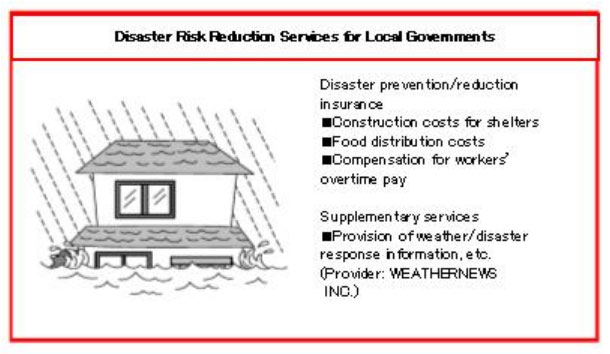“Disaster Risk Reduction Service” for Local Governments
Sompo Holdings, Inc.
| Publication date | May 26, 2022 (Posted on May 18, 2022) |
|---|---|
| Sector | Natural Disasters / Coastal Areas |
Company Overview

The SOMPO Group is engaged in a variety of businesses, primarily in the P&C insurance business in Japan and overseas, as well as life insurance, nursing care and healthcare businesses.
Climate Change Impacts
As typhoons become stronger and torrential rains increase due to the effects of climate change, the risk of natural disasters is likely to increase. For this reason, it will become even more important for local governments to take measures to protect the lives of residents from natural disasters, such as issuing evacuation alerts at an early stage.
Adaptation Initiatives
In order to protect the lives of residents from natural disasters, local governments are required to issue evacuation orders at an early stage. If a certain amount of damage is actually caused by a natural disaster after an evacuation order is issued, local governments can receive subsidies from the national and prefectural governments for the cost of evacuation under Japan’s Disaster Relief Act. On the other hand, if no disaster occurs after the evacuation alert is issued, the local government will be responsible for the cost of preparing evacuation centers. Consequently, there is a risk that local governments may hesitate to issue evacuation orders.
In this context, we developed a “disaster prevention/reduction insurance” for local governments. With this insurance, even if the disaster does not occur as anticipated after the issue of the evacuation order, the costs that incurred due to the evacuation order such as setting up evacuation shelters and supplying food or daily necessities, will be covered. In other words, it is an insurance that subsidizes the costs incurred when the evacuation order fails. Our Group combines this insurance with a supplementary service that provides weather information and information on response measures, and offers it as a Disaster Risk Reduction Service (Fig.1).
In this way, the Disaster Risk Reduction Service will help local governments establish a quick initial response system by reducing the cost associated with the issue of evacuation order by local governments, and by providing insurance to support the government's effort to issue the evacuation order at an early stage, along with information on weather and response measures. This insurance started in FY2017 and has already been purchased by 250 local governments as of the end of March, 2019.
Effects / Expected Benefits
By purchasing this insurance, local governments will be able to issue evacuation orders at an earlier stage without hesitation and to prepare for any possible emergency. This is expected to reduce the risk of threats to the livelihoods of residents in the event of natural disasters.
In fact, more local governments are issuing evacuation orders without hesitation due to the insurance coverage. In FY2017, 80 local governments have been covered by the insurance.


